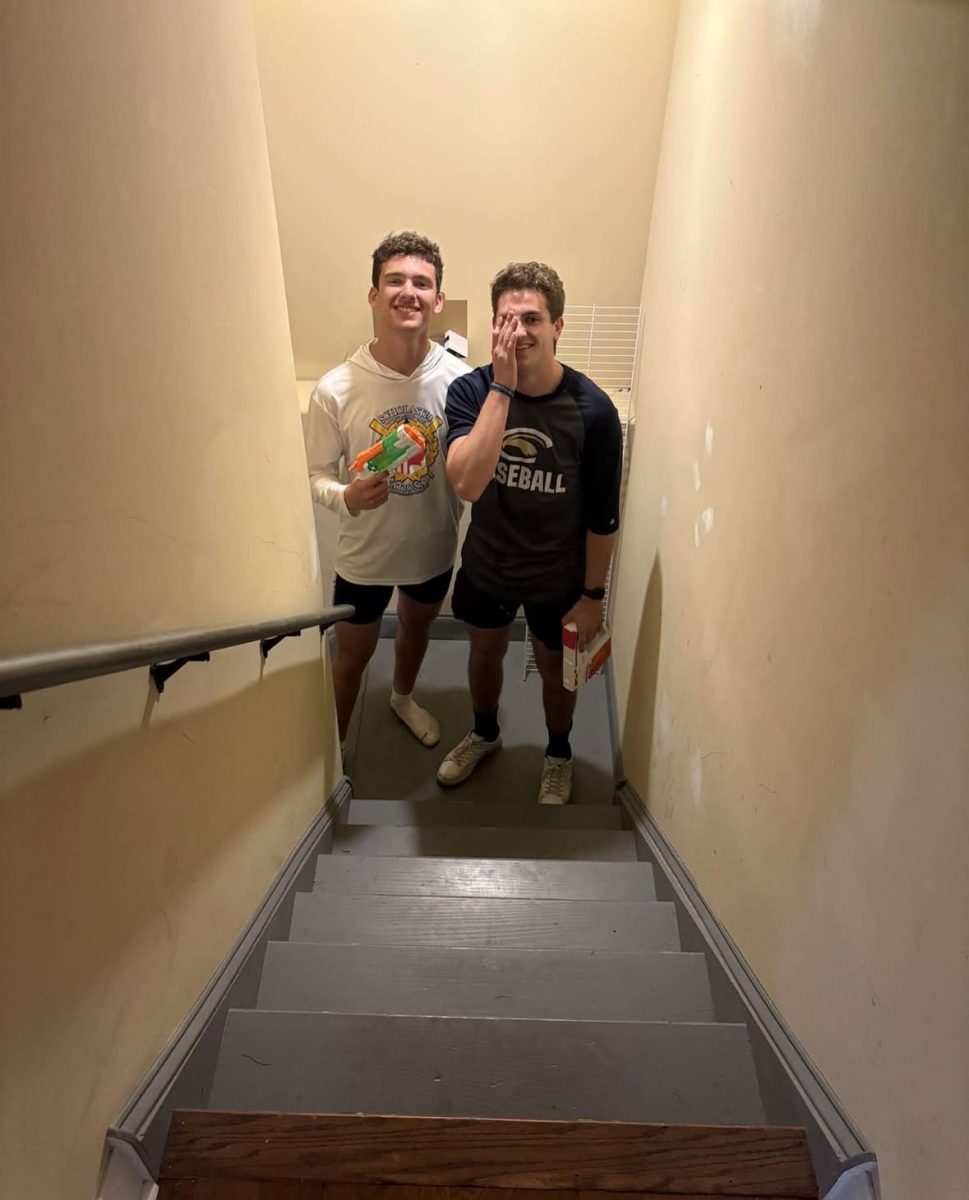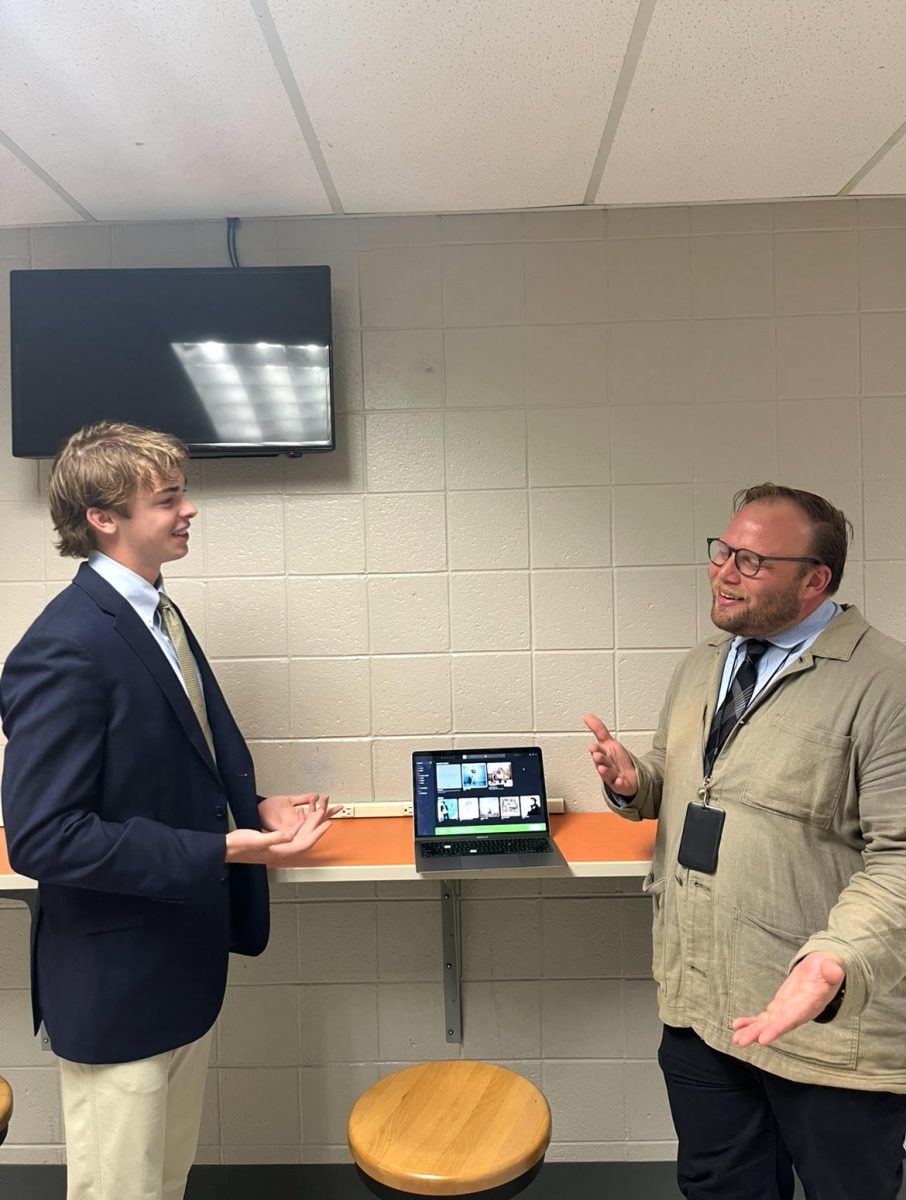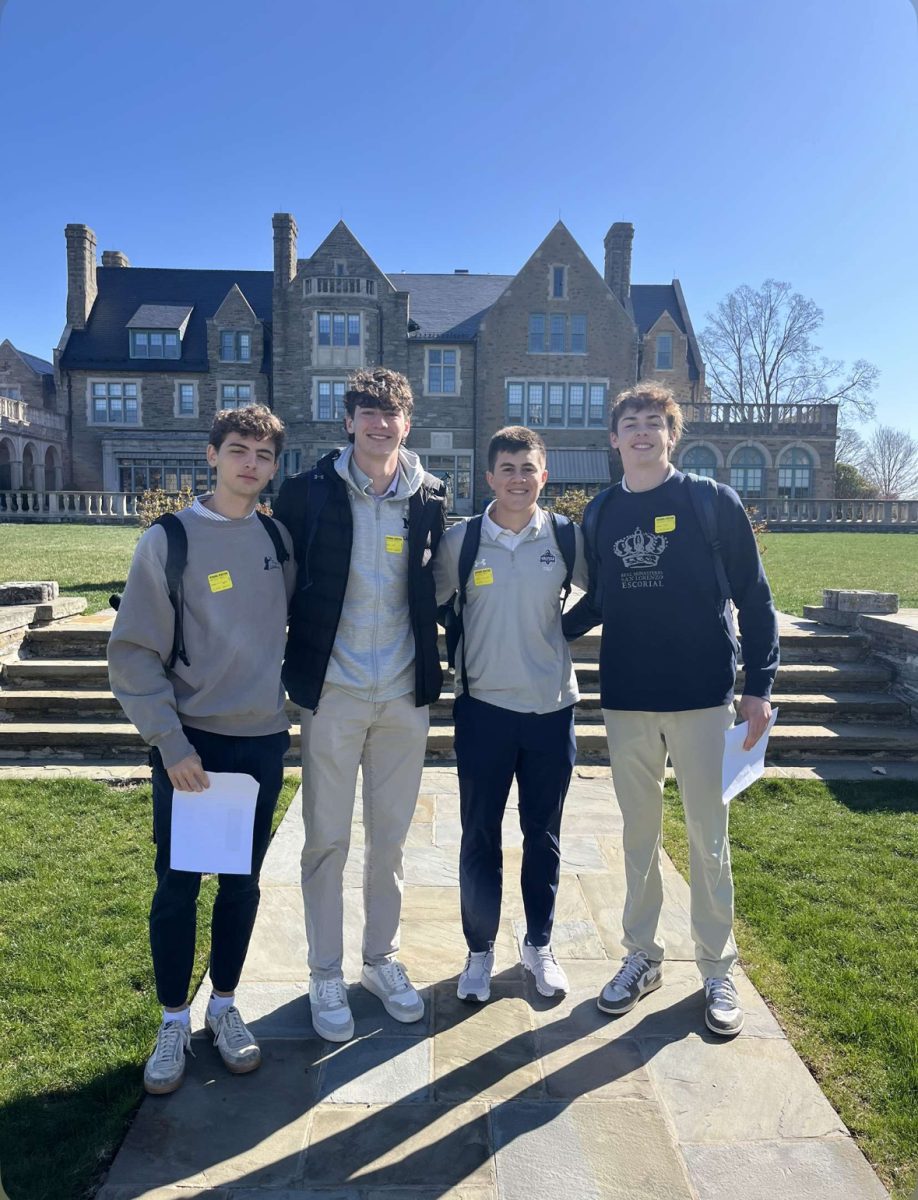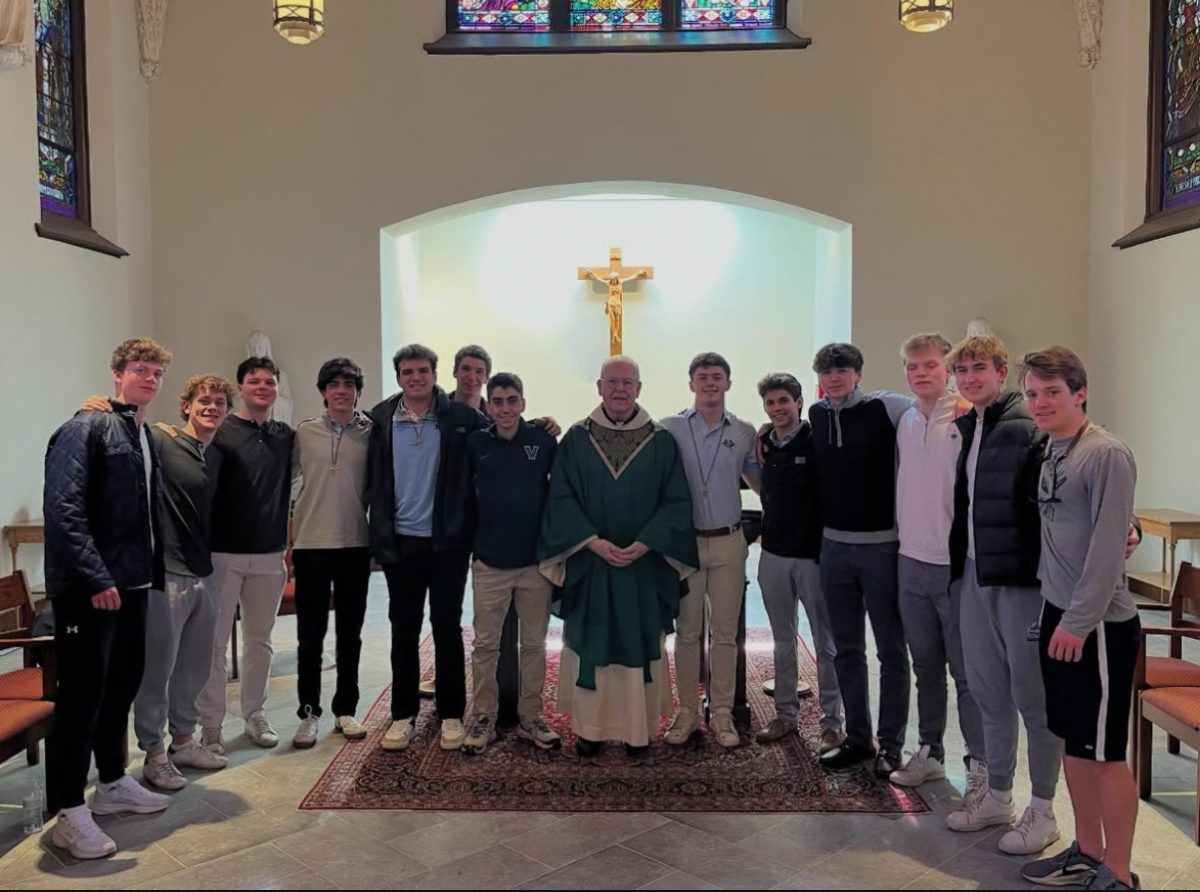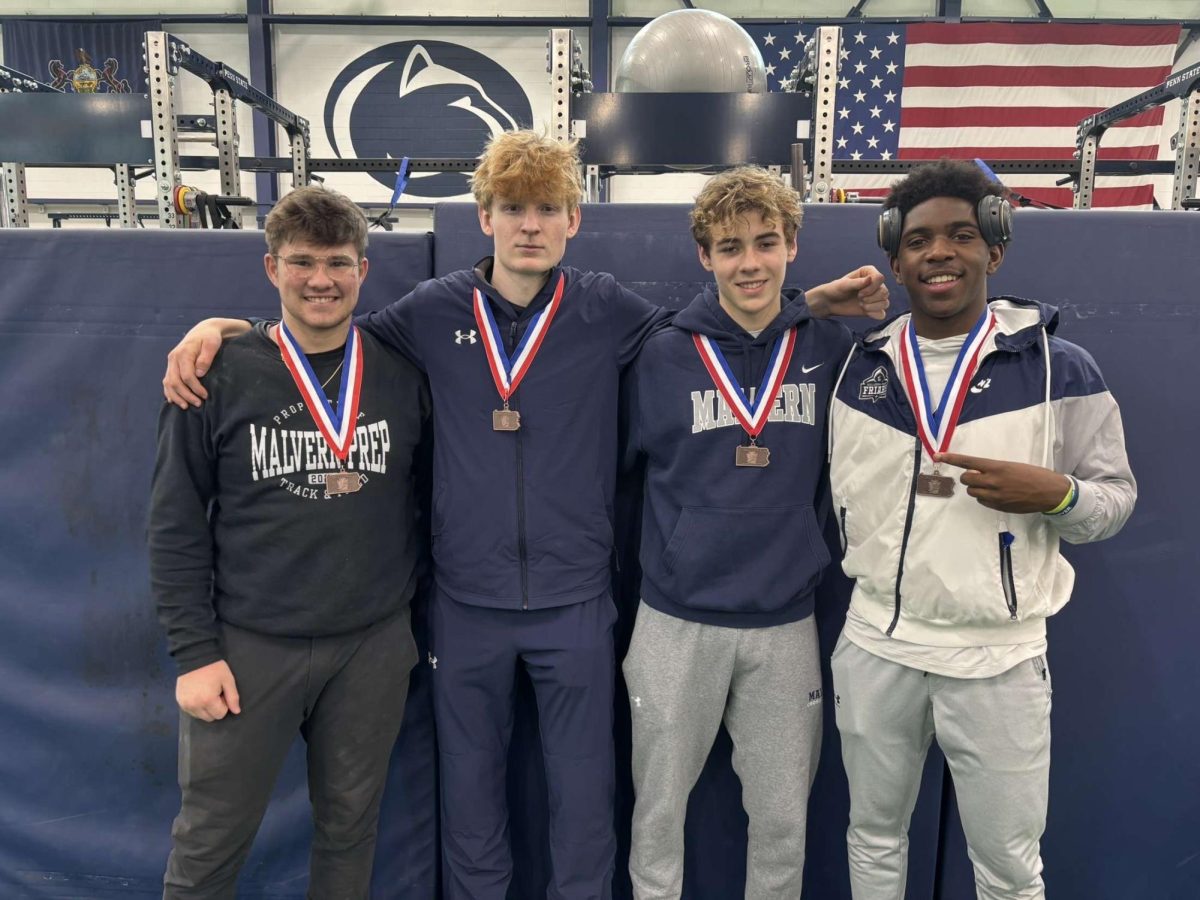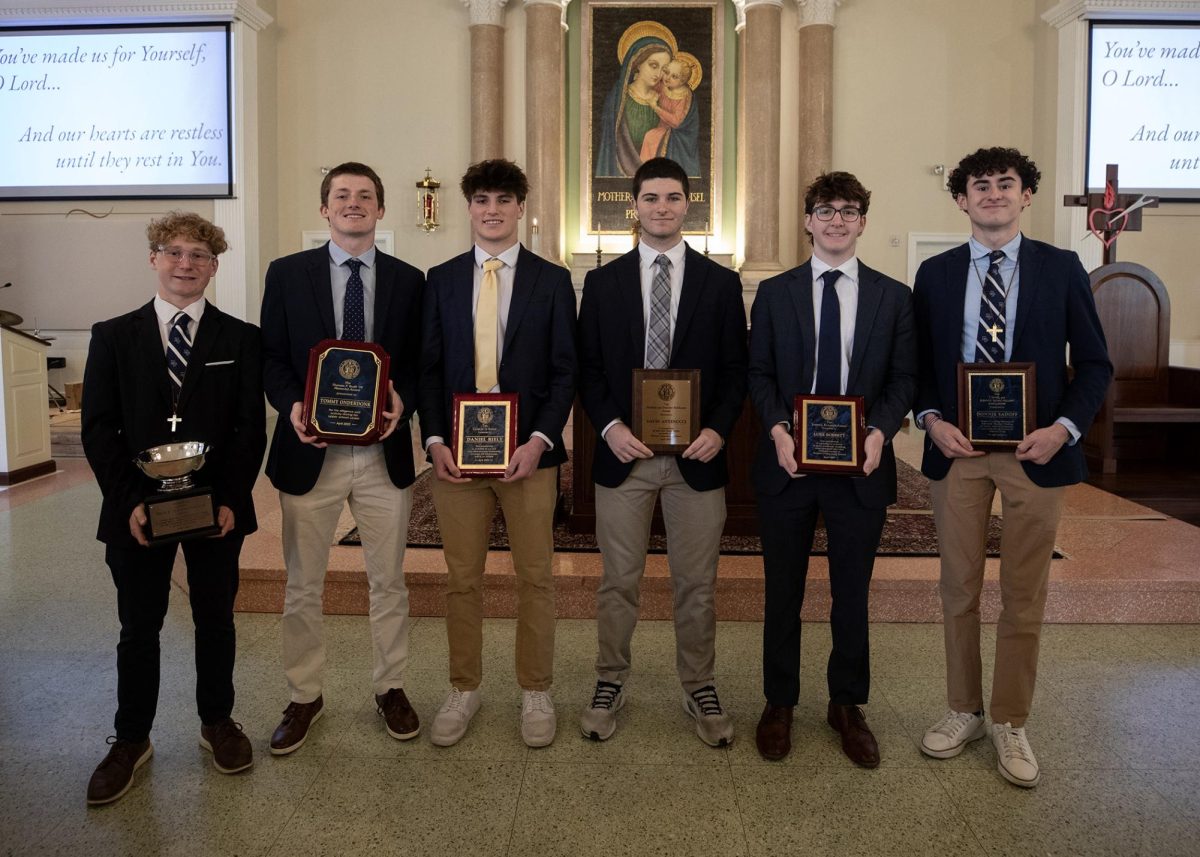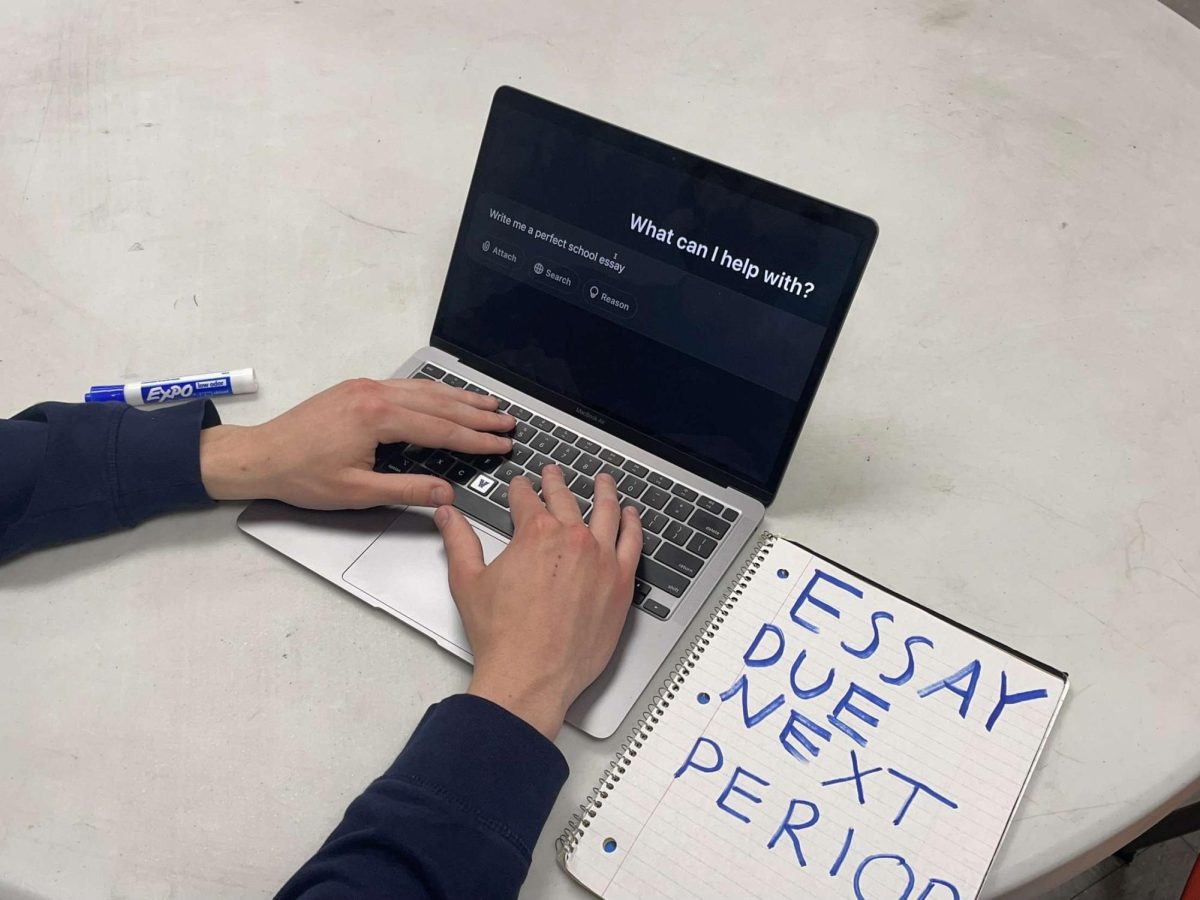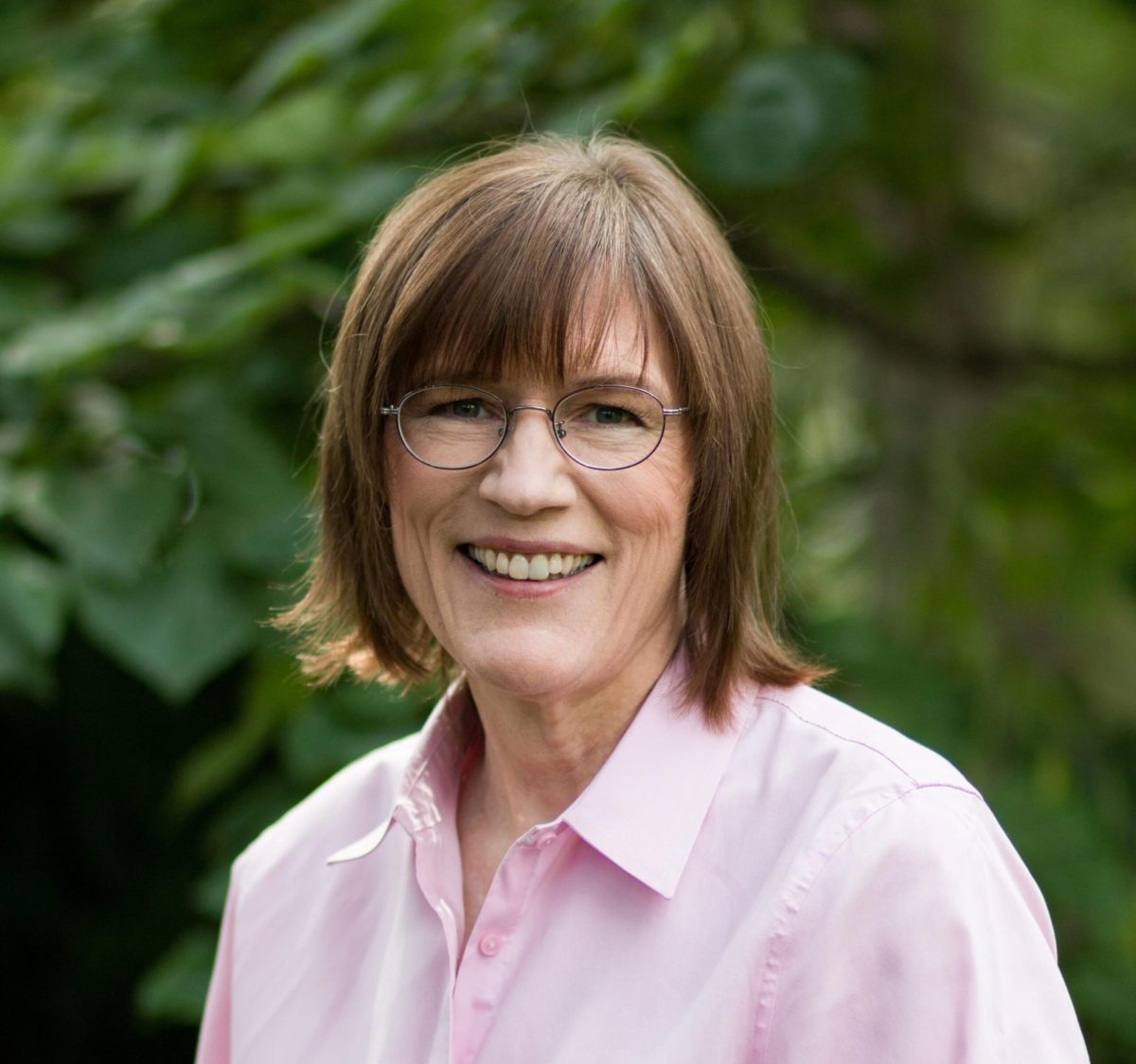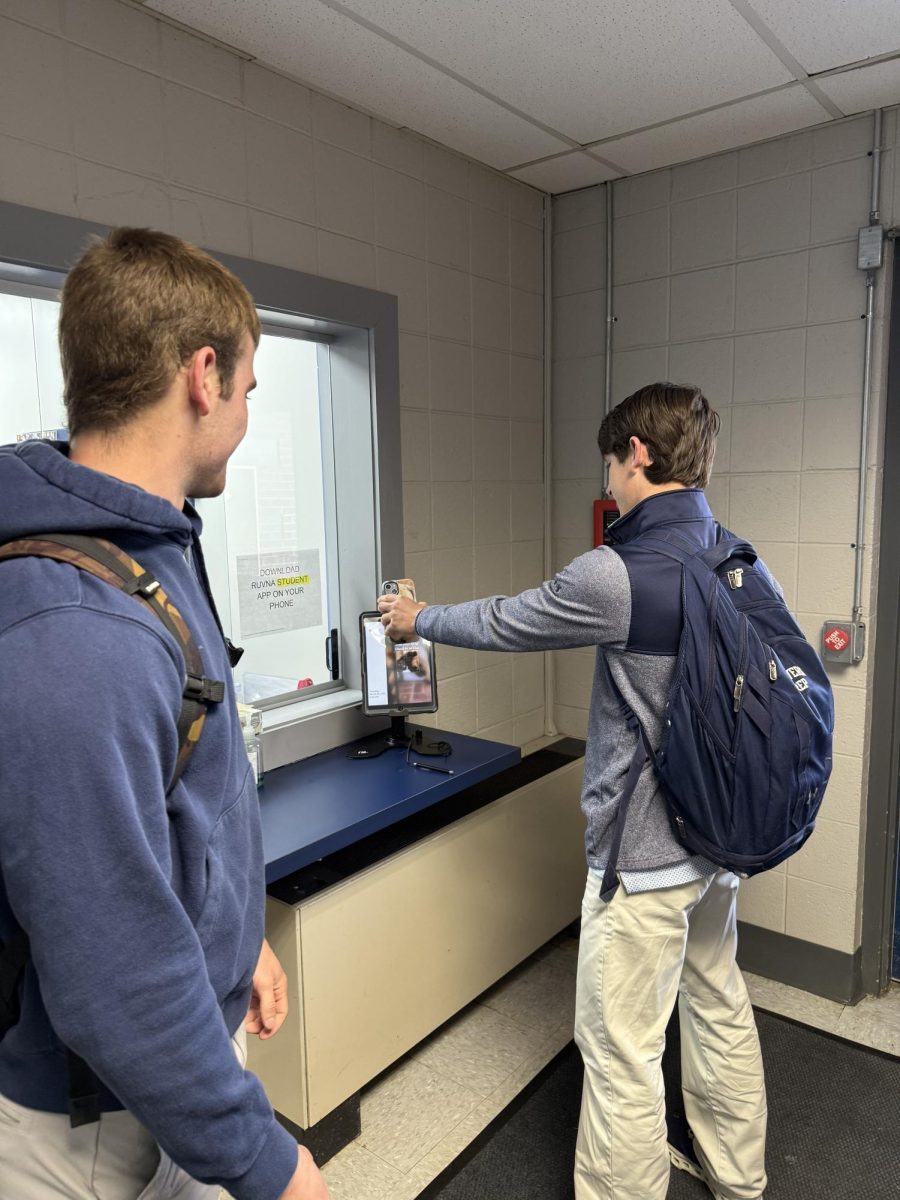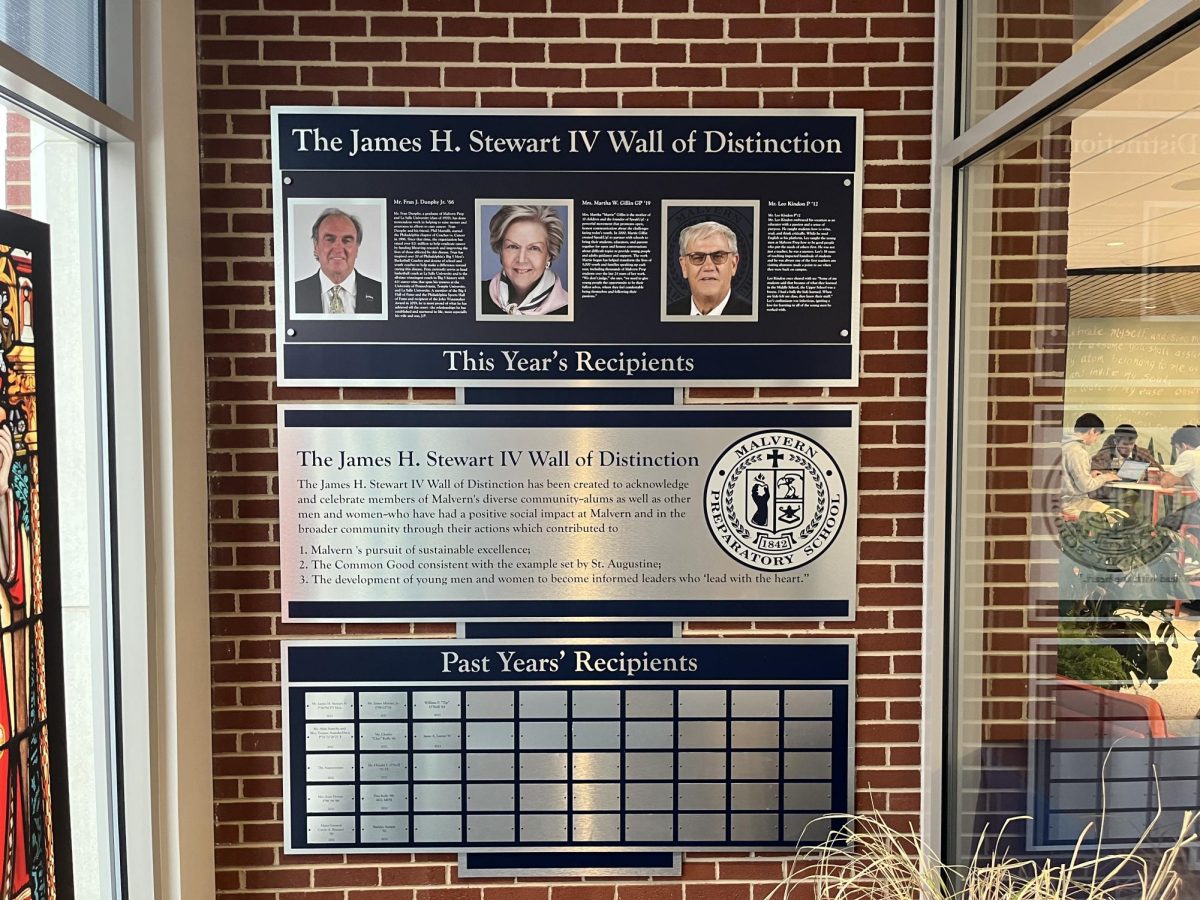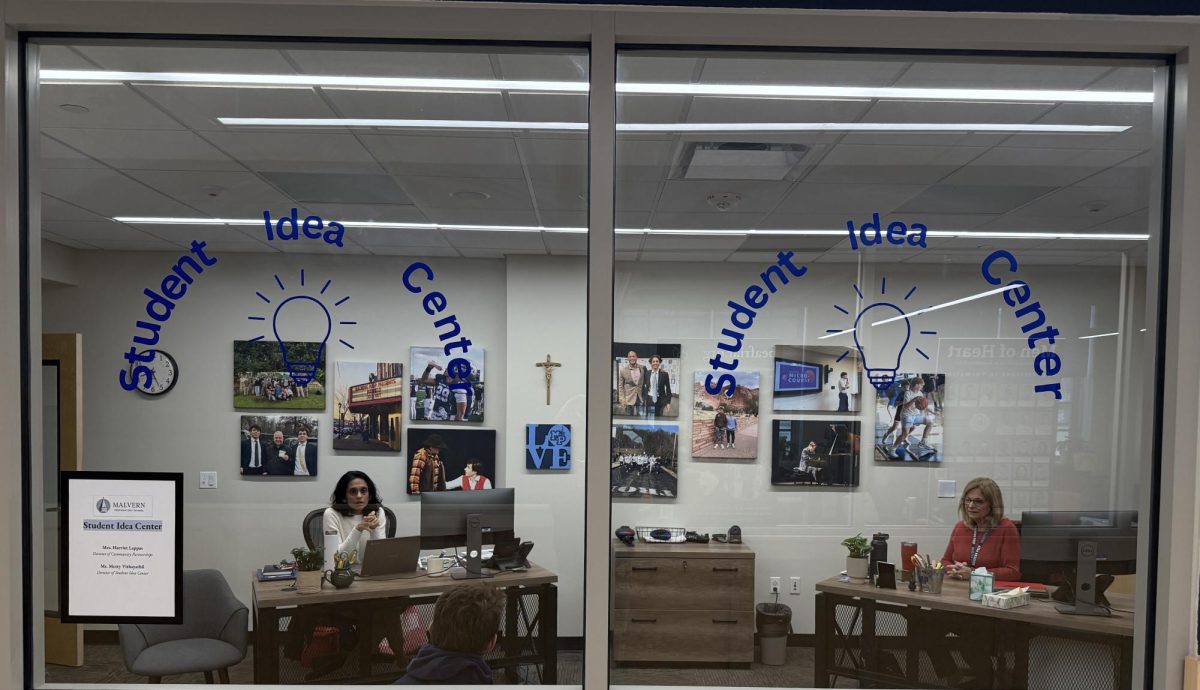The Malvern community prides itself on being tight knit and caring. We all want to show care for those who need it.
There is a group of people within our community who have faced one of life’s most difficult challenges – cancer.
Each person has taken lessons and experiences that have helped them develop into the people they are today.
The staff of The Blackfriar Chronicle wanted to tell their stories.
This month’s issue highlights how cancer has affected Malvern’s community in many different aspects. We hope this issue can be a catalyst for creating an even more caring and loving community.
 Two-time breast cancer survivor reflects on the love and support she has experienced throughout her illness.
Two-time breast cancer survivor reflects on the love and support she has experienced throughout her illness.
Christopher Bunn ’16
When math teacher Mrs. Diane Zulli thinks about her cancer, she focuses on the blessings.
“The number one biggest blessing of being sick – in this case having cancer – is the phenomenal love you get from people,” she said. “The love and support I get from people is beyond anything that I ever imagined.”
She described rides from neighbors, meals from co-workers, cards from students, flowers from the Mothers’ Club, and a husband who has been beside her every step of the way.
“My teenager who used to be a regular teenager pretty much ignored me, because your mom is just mom,” she said. “After I got sick she started supporting me. She would make meals. It turned out she’s a really good cook.”
A mathematics teacher, Zulli originally went to the University of Delaware and Boston University to obtain a degree in Computer Science. Before entering Malvern six years ago, she taught college students.
Zulli is a two-time breast cancer survivor. According to the National Breast Cancer Foundation, Zulli is one of the 1 in 8 women who will be diagnosed with breast cancer in their lifetimes.
Zulli was working at Malvern in 2013 when she was first diagnosed with breast cancer. Her doctor was hesitant to say that she had cancer. “The first time a doctor said ‘You need a surgeon,’” she said. “He would not say the word cancer.”
“He was not my doctor after that,” she said.
The second instance of breast cancer occurred in 2015. This time, Zulli expected the news. “This time I knew. Getting called back after the test is not good,” she said.
For Zulli, waiting is one of the worst parts of cancer.
“Once you have cancer for the rest of your life you will have to ask,” she said. “You have doctor’s appointments, and doctor’s appointments, and doctor’s appointments, and test, and test, and test.”
After the tests, there is more waiting.
“Sometimes [tests] are fine, sometimes they are not, and sometimes they are ambiguous, which is what has happened to me several times,” she said. “I have personally found that the waiting and not knowing is the worse than the treatment.”
For Zulli, it was difficult to break the news to some family members. “It was very hard to tell my daughter. She was smart. I tried to downplay it but she’s intelligent and she looked it up on the Internet,” she said.
“The next hardest thing with my mother. She does not take things well. I no longer tell her. I just do not give bad news. She’s older and she just can’t handle it,” Zulli said.
In addition, Zulli’s treatments interfered with work. Often she could not control when she could not attend work or how many times she would be out.
“When you’re healthy you just take for granted that you will be fine every day and that you’ll come in every day. All of a sudden you’re not so healthy and you have no control over it,” Zulli said.
Despite the surgeries, chemotherapy, and radiation treatments, Zulli believes that having cancer was a blessing.
“After my first diagnosis it took me two weeks before I thanked God, and told him I understood the message,” she said.“I needed to change my priorities. I need to live my values… I live a better life when I know that it’s not permanent,” Zulli said.
In both instances of breast cancer, Zulli underwent surgery, chemotherapy, and radiation treatment.
Before her surgery, Zulli expected to experience a lot of pain. “I waited for all this terrible pain and I even got ready for it by practicing meditation,” she said.
However, after her surgery, she never had significant amounts of pain. ”I’m still shocked,” she said. “I woke up from surgery feeling awake, aware, clear headed, and not in pain.”
“Discomfort? Oh yes. Was I sore? Definitely. But it wasn’t terrible,” she said.
Afterwards, Zulli underwent chemotherapy. “The first one was the worst, because you’re scared. You don’t know what to expect. And you don’t know yet how to use all the meds that you need to help with all the side effects.”
However, as she underwent more chemotherapy treatments, it became much more manageable. “Then after the first time you know what to expect. You know the people. You’ve got the routine down,” Zulli said. “I just told myself this is going to save my life and this is this what you’re going to do.“
Finally, she underwent radiation treatments. “By then I was feeling pretty confident. Because surgery wasn’t bad and chemo wasn’t so bad,” she said.
However, Zulli ended up disliking these radiation treatments the most. The “disruptive” radiation was every day for six weeks. “Your skin got burned and I had to try to keep my arm out for weeks. It was very hard. You would be surprised how heavy your arm is,” she said.
Among the wide variety of conventional treatments Zulli has received, she has also tried alternative treatments as well. She has received acupuncture, which has helped her recover from the nerve damage from her surgeries. Through the University of Pennsylvania, she has received Reiki.
According to Reiki.org, Reiki is a Japanese technique for stress reduction and relaxation that also promotes healing. “[It] is a cool kind of hands-on healing.” Zulli said.
To other people who are in the process of undergoing cancer treatment or who are recovering from cancer, Zulli highly recommends seeking out the various free resources that are offered. She described a free wig, free gym membership, nutrition counseling, and even some drawing lessons – of a sort.
“I’ve gone to a free class that has taught me how to draw my eyebrows,” she said. “I didn’t mind my head being bald, but I really couldn’t stand having no eyebrows. When I looked in the mirror it didn’t look like me. They gave me a pencil and taught me how to put eyebrows on. It was very easy.”
This year, Zulli has been dealing with a mass in her liver. She described this diagnosis as initially scarier than her other cancers.
“At first I was told that it was cancer, and that the prognosis was measured in months,” she said. “That was a little dramatic.”
However, after a few more tests, her outlook is now positive. “After a few days and a few tests, I was told that it was benign,” she said.
 Dr. Richard Yelovich ’73 gives his expertise on his work and the progress of cancer research.
Dr. Richard Yelovich ’73 gives his expertise on his work and the progress of cancer research.
Danny Malloy ’18
How do you solve a problem that, at first glance, seems unsolvable?
Devote your life to solving that problem. That problem is cancer, and that path is the one Dr. Richard Yelovich ’73 has chosen to take.
“Cancer is able to change and mutate at a rate that has thus far outpaced developed strategies through different drugs and other anti-cancer methodologies to stay ahead of it,” Yelovich said. “It is a challenge to make very small strides each year in the fight against it.”
Dr. Yelovich is a radiation oncologist at both Paoli Hospital and the Comprehensive Cancer Care in Exton. He has been working in this field for 28 years.
“Radiation oncologists use high-energy x-rays to destroy cancer cells focused in on a tumor,” Yelovich said. “Radiation is non-discriminant, meaning it works the same on all tumors to target the DNA of the cancer cell.”
Yelovich said that there are three branches of oncology that work together to treat cancer patients- surgical, medical, and radiation forms.
Medical oncologists give chemotherapy to treat patients, while surgical oncologists use surgery to remove tumors and biopsies to find tumors. Physicians and researchers in all three branches work together to treat the disease.
“Each patient has to be assessed given the type of cancer, the location, and the various characteristics to determine what the best form of treatment is,” Yelovich said. “Some cancers do not require radiation at all, like leukemia and lymphoma cancers which only need chemotherapy,” Yelovich said. “There are some cancers that only require surgery, and some only requiring radiation.”
After Yelovich graduated from the University of Notre Dame in 1977, he did a residency at University of Pennsylvania’s Internal Medicine which exposed him to many medical practices, including oncology. He became interested in helping cancer patients during this time.
“Since I had not done a surgical residency, my choices were to go into medical oncology, or radiation oncology,” Yelovich said. “I chose radiation oncology to medical because that was my personal preference on how to treat patients.”
After working with patients with cancer for many years, Yelovich said that cancer has certain challenges to it than treating other diseases.
“The cells grows in an aberrant fashion,” Yelovich said. “With cancer, often times the cells are allowed to grow without the patient’s knowledge until it results in a space-occupying phenomena resulting in pain or bleeding.”
Then this phenomenon – known as a malignant tumor – has the ability to spread. Tumors in multiple parts of the body can result in death.
The puzzle for a cancer researcher is to understand how these cells and tumors operate.
“We are still struggling as a science to understand everything that takes place on the cellular level, and the mechanisms that turn the cell malignant,” Yelovich said. “If we can figure out how the malignant cell operates then we can create better drugs to target specific cancers.”
Although there is still a long way to go to stop this disease, Yelovich identified some of the new advances in treatment, including the refinement of surgical techniques, new biological chemotherapies, and the development of photon beam radiation treatment.
In the fight against cancer, any advances made are big ones. Researchers and oncologists like Yelovich work hard to keep this disease on its heels.
“We make small but significant strides each year,” he said.
 From having Cancer to raising money for it, Andrew Clark holds strong.
From having Cancer to raising money for it, Andrew Clark holds strong.
Tommy White ’17
Junior Andrew Clark was diagnosed with Leukemia at age three, and now he’s helping others in the same situation.
On February 20, the “Catch the Cure” fundraiser was held at the Main Line Sports Center in Berwyn in order to help raise money for research about Acute Lymphoblastic Leukemia (ALL). This is the type of cancer Andrew had when he was a child.
The event included various sports activities, such as dodgeball and Bubble Soccer, as well as a silent auction.
In September, Andrew learned he had been nominated for the Student of the Year campaign, which aims to raise money for helping kids with Leukemia. He was nominated by his friend, Mark Rodgers, who was treated with Andrew at AI Dupont Hospital for Children in Delaware.
Andrew joined the other candidates at the training sessions held in preparation for fundraising. He has met with Campaign Specialist Emily Fiore every other week for three months in order to get questions answered and update her on the status of his event. According to Clark, Fiore organizes all the time tables, sample forms, fundraising ideas, and contacts.
Andrew created his formal letters and emails. He had various posts on social media promoting the event and getting sponsors to donate money to help launch the event. They made t-shirts and various things to sell at the event as well. Andrew reached out to Malvern Head of School Mr. Christian Talbot and President Fr. James Flynn in order to get permission to post flyers to spread the word around campus effectively.
“I got Coach McEvoy to send out a couple emails every week about the event.” Andrew said. “I talked to Mr. Ruch and he was able to do the same thing.”
The Clark family decided what the money was being raised for, where to host the event, and what the event would include. Andrew decided to raise money for ALL research, because that was the cancer he had when he was a child. He wanted to do something with sports and he wanted it to be an event for all ages.
“During the first meeting, he said he wanted to do something in the style of an auction.” Fiore said. “He also came up with an idea for a venue.”
Andrew plays goalie on Malvern’s lacrosse team. The team practices at the Main Line Sports Center, and he has seen auctions there in the past. He knew that this would be the perfect spot to host his event. He reached out to owner Pat Holloway and he and Fiore started to communicate.
The event turned out to be a huge success for the Clark family. They raised $12,000, and they are still waiting to hear about how much money they made in ticket sales.
“It was a great time and it was a great event,” Mac Updike ‘17 said. “We raised a lot of money and hopefully it will help cancer research.”

“My experience at the event was blessed,” Matt Schellenger ‘17 says. “I played lots of bubble soccer.”
According to Mrs. Clark, “everyone has been very supportive.” There were students in attendance from all grades at Malvern, with a majority from the junior class. She said that some students worked at the event, and that the silent auction went extremely well.
People were also very supportive when Andrew was originally diagnosed with ALL as a child.
At first, his parents saw what appeared to be a rash around his back and abdomen. When the treatments weren’t working, Andrew was examined by his doctor. It turned out that he was bleeding under his skin in those areas. Tests confirmed that Andrew had leukemia.
It was hard for the Clark family to hear this news.
“Our reaction to Andrew’s diagnosis was typical of those who are dealing with news this devastating,” Mrs. Clark said. “We were shocked, then scared, and sad. We wondered if there had been an error in the testing. We thought we might lose him.”
Andrew said he was too young to remember his diagnosis. “It was harder for them then it was for me,” he said.
Initially, Andrew was in the hospital for ten days, during which he was stabilized and treated through the outpatient clinic. After this, he would go to the hospital for checkups as well as chemotherapy. That process went on for nine months.
Andrew’s life turned upside down. Instead of going to preschool, he got IVs, received a port, and had bone marrow biopsies.
On some occasions, he would have to stay at the hospital because he would receive a treatment that requires observation afterwards. Infections would also occur at random occasions, and he would be put into isolation until they wore off.
“Although the hospital tries very hard to entertain the children who are admitted,” Mrs. Clark said, “it was always such a great feeling for all of us when he was allowed to go home.”
During his time in the hospital, Andrew received somewhere around 18 different drugs, all with different functions. Some would be used to kill the cancerous cells and others were used to get Andrew through the side effects.
Andrew managed the treatments pretty well, but there was sometimes pain, fatigue, and numbness. According to his family, Andrew was very strong through his cancer experience. Mrs. Clark said he would often “muscle through the whole thing day by day until it was over.”
Some days he would not even speak, so during these days his parents would try especially hard to make him comfortable. While in the hospital he would watch movies and play video games. Some days he even chased the nurses up and down the hallways on his bike.
After seven years of treatment and uncertainty, there were no more cancer cells in Andrew’s body. His family continues to pray that no cancer cells will return.
“When I meet a family that is battling cancer I always try to just listen.” Mrs. Clark said. “When people are struggling to make sense of a new diagnosis, or praying that a new treatment will work this time, they have been talked to from every direction. They even find themselves having to comfort their closest friends and family because everyone is sad and scared.”
Of course, his family was very relieved when Andrew was able to go home. It meant the world to them and Andrew.
“It felt amazing [when I left the hospital].” Andrew said. “We went out to lunch and just relaxed.”
 María, one of Malvern’s cleaning staff, left her family and traveled over 2,500 miles in her battle against cancer.
María, one of Malvern’s cleaning staff, left her family and traveled over 2,500 miles in her battle against cancer.
Justice Bennett ’16
María got in the car to leave for the United States without knowing a single word of English.
It was April 8, 2009, and her decision to pick up and go was not personal desire; it was life or death. She was leaving her two children and four-year-old grandson over 2,500 miles away.
María, a member of Malvern’s cleaning staff, had been diagnosed with serious ovarian cancer.
Ovarian cancer can be one of the most lethal cancers. According to the American Cancer Society (ACS), it is rarely identified early on and is difficult to treat in an advanced state. ACS predicts in 2016 that about 22,280 women in the United States will be diagnosed with ovarian cancer, and roughly 55% of women diagnosed with ovarian cancer will die within five years of diagnosis.
María was one of the lucky ones whose cancer was identified early.
“Thank you, God,” María said, in *Spanish. “Thank you, God.”
When the news came, her brother was living in the United States. He recommended that she come because the machines and treatment options are better here.
She came to America with little money, so paying for treatment was difficult. Maria said that the doctors at Chester County Hospital in West Chester helped with her application for Medicare.
None of her doctors speak Spanish, so this can complicate things with her treatment. However, after the doctors successfully helped her get on Medicare, the government provided a translator that she can call on her phone whenever she needs it.
It’s a big difference from her former life in Tenancingo, Mexico, a large municipality with just less than 100,000 residents. Her home is about two hours away from Mexico City, but a 40 hour car drive away from Chester County.
When she came to the United States, her brother was here initially to help her as she went through surgery. But after the first year, her brother returned to Mexico, and she was left with no family nearby and a daunting nine years of cancer treatment ahead of her – chemotherapy, radiology, and all.
In Mexico, her son (27), daughter (29), and now 12-year-old grandson continue to grow up – their relationship mostly reduced entirely to cell phone pictures and long distance calls.
“I am very sad. They are so far away,” María said.
She said her doctors estimate that she still has three years of treatment left, which would complete a full decade of treatment and time away from her family and friends in Mexico. As soon as her treatment is over she is excited to return to her family.
Since she left, her family started building a new house María said she hopes to see that house completed someday.
María said she joined Malvern’s cleaning staff because one of her friends is on the cleaning staff and invited her.
“I like my job very much. It is very calm and peaceful,” she said.
Every weekday from 4 p.m. to 11 p.m. María is charged with cleaning the Middle School Modular Space and The Duffy Arts Center. From vacuuming all the floors, to cleaning the windows, to mopping the ceramics studio – she does it all.
“I am very grateful to God that he guides me in the United States to very good people that have big hearts,” she said with a smile that was almost too big for her small stature.
*The reporter translated María’s interview to English for the purpose of this story, and consulted with a native Spanish speaker for accuracy.



